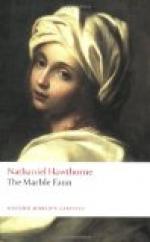But they enlarged—and never were weary of the theme—upon the blithesome effects of Donatello’s presence in his rosy childhood and budding youth. Their hovels had always glowed like sunshine when he entered them; so that, as the peasants expressed it, their young master had never darkened a doorway in his life. He was the soul of vintage festivals. While he was a mere infant, scarcely able to run alone, it had been the custom to make him tread the winepress with his tender little feet, if it were only to crush one cluster of the grapes. And the grape-juice that gushed beneath his childish tread, be it ever so small in quantity, sufficed to impart a pleasant flavor to a whole cask of wine. The race of Monte Beni—so these rustic chroniclers assured the sculptor—had possessed the gift from the oldest of old times of expressing good wine from ordinary grapes, and a ravishing liquor from the choice growth of their vineyard.
In a word, as he listened to such tales as these, Kenyon could have imagined that the valleys and hillsides about him were a veritable Arcadia; and that Donatello was not merely a sylvan faun, but the genial wine god in his very person. Making many allowances for the poetic fancies of Italian peasants, he set it down for fact that his friend, in a simple way and among rustic folks, had been an exceedingly delightful fellow in his younger days.
But the contadini sometimes added, shaking their heads and sighing, that the young Count was sadly changed since he went to Rome. The village girls now missed the merry smile with which he used to greet them.
The sculptor inquired of his good friend Tomaso, whether he, too, had noticed the shadow which was said to have recently fallen over Donatello’s life.
“Ah, yes, Signore!” answered the old butler, “it is even so, since he came back from that wicked and miserable city. The world has grown either too evil, or else too wise and sad, for such men as the old Counts of Monte Beni used to be. His very first taste of it, as you see, has changed and spoilt my poor young lord. There had not been a single count in the family these hundred years or more, who was so true a Monte Beni, of the antique stamp, as this poor signorino; and now it brings the tears into my eyes to hear him sighing over a cup of Sunshine! Ah, it is a sad world now!”
“Then you think there was a merrier world once?” asked Kenyon.
“Surely, Signore,” said Tomaso; “a merrier world, and merrier Counts of Monte Beni to live in it! Such tales of them as I have heard, when I was a child on my grandfather’s knee! The good old man remembered a lord of Monte Beni—at least, he had heard of such a one, though I will not make oath upon the holy crucifix that my grandsire lived in his time who used to go into the woods and call pretty damsels out of the fountains, and out of the trunks of the old trees. That merry lord was known to dance with them a whole long summer afternoon! When shall we see such frolics in our days?”




